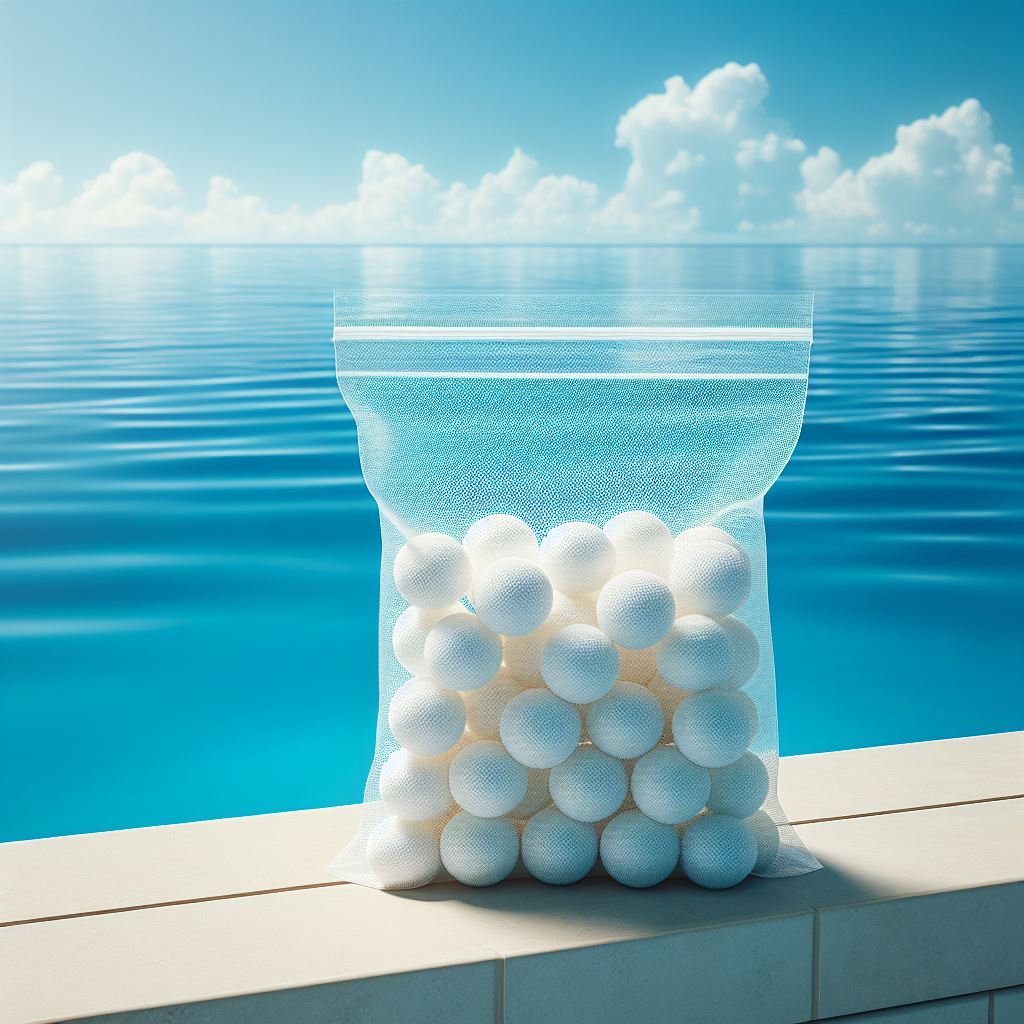Summer is here, and people are flocking to pools to cool off. However, maintaining pool water quality in different climates can be challenging. To address this issue, pool filter balls have emerged. How do these filter balls perform under various climate conditions? Today, we will explore this topic in depth and see how filter balls function in different climates.

What Are Pool Filter Balls?
Pool filter balls are a new type of filtration medium made from high-polymer materials, typically ranging from a few millimeters to a few centimeters in diameter. They circulate water through the pool’s filtration system, trapping tiny particles such as dust, leaves, and bacteria. Compared to traditional sand filter systems, filter balls offer higher filtration efficiency and a longer service life.
Filtration Effectiveness in Warm and Humid Climates
Impact of High Humidity on Water Quality
In warm and humid climates, the high humidity levels make it easier for microorganisms and algae to grow in pool water. Especially in the summer, the combination of high temperatures and high humidity provides ideal conditions for bacteria and algae, increasing the difficulty of maintaining water quality.
High-Efficiency Cleaning Ability of Filter Balls
In such climates, the advantages of using pool filter balls are evident. The fine pores of filter balls effectively trap and remove tiny particles, including bacteria and algae. With regular backwashing, filter balls can maintain high filtration efficiency, keeping pool water clear and transparent.
Reduced Use of Chemical Agents
Due to the high filtration efficiency of filter balls, the use of chemical agents can be reduced in warm and humid climates. This not only helps protect the pool water environment but also reduces chemical irritation to swimmers, providing a safer swimming experience.
Filtration Effectiveness in Dry and Hot Climates
Challenges to Water Quality from High Temperatures
In dry and hot climates, the rapid evaporation of pool water leads to a drop in water levels, concentrating impurities and minerals, which can deteriorate water quality. Additionally, under intense sunlight, disinfectants like chlorine break down more quickly, complicating water quality maintenance.
High Dirt-Holding Capacity of Filter Balls
Facing the challenges of high temperatures and dryness, pool filter balls, with their high dirt-holding capacity and efficient filtration performance, can address the problem of deteriorating water quality. They quickly remove accumulated impurities, maintaining water clarity. Moreover, filter balls reduce the reliance on chemical agents, preventing their rapid breakdown under high temperatures.
Water Conservation
Since water resources are relatively scarce in dry climates, using filter balls can reduce the frequency of backwashing, thereby conserving water. Compared to traditional sand filter systems, the higher filtration efficiency and lower maintenance frequency of filter balls provide an effective solution for saving valuable water resources.
Filtration Effectiveness in Cold Climates
Impact of Low Temperatures on Water Quality
In cold climates, pool usage decreases, and water temperatures are lower. Although microorganism growth slows in low temperatures, prolonged idleness can lead to water quality deterioration, such as sediment and decay.
Durability of Filter Balls
Pool filter balls are durable and stable, maintaining high filtration performance even in low temperatures. Regular operation of the filtration system prevents the accumulation of sediment, keeping the water clean.
Energy Savings
In cold climates, maintaining pool water temperature consumes a lot of energy. The high filtration efficiency of filter balls can reduce the operating time of heating equipment, saving energy. Additionally, the low maintenance requirements of filter balls reduce the operational and maintenance costs of equipment.
Filtration Effectiveness Throughout the Seasons
Seasonal Water Quality Changes
As the seasons change, climate conditions vary, posing higher demands on maintaining pool water quality. Spring pollen, summer heat, autumn leaves, and winter cold all impact pool water quality differently.
Versatile Performance of Filter Balls
Whether dealing with spring pollen, summer heat, autumn leaves, or winter cold, filter balls perform excellently. Their high filtration efficiency and durability maintain clean and stable water quality under different seasonal conditions. Using filter balls simplifies daily pool maintenance and ensures stable and clear water quality year-round.
Comparison Between Filter Balls and Traditional Sand Filter Systems
Filtration Effectiveness
Compared to traditional sand filter systems, filter balls offer higher filtration precision and efficiency. Bestway filter balls can capture finer particles, ensuring clearer water quality. Traditional sand filter systems, with coarser filter materials, may miss finer impurities, affecting water quality.
Service Life
Filter balls typically have a longer service life than traditional sand filter systems. They do not require frequent replacement, reducing maintenance costs. Sand in traditional sand filter systems needs regular replacement and cleaning, increasing the workload and maintenance expenses.
Maintenance Convenience
Filter balls are easier to maintain, requiring less frequent backwashing and no frequent filter material replacement like sand filter systems. This makes filter balls more convenient for daily use, saving time and effort, and enhancing user experience.
Conclusion
Analyzing the filtration effectiveness of pool filter balls under different climate conditions reveals their significant advantages in improving water quality, reducing maintenance workload, and conserving resources. Despite some pool filter balls review mentioning potential issues, their long-term benefits are undeniable. In today’s world with changing climates, choosing bestway filter balls as a pool filtration medium is undoubtedly an important step towards environmental efficiency.

 Instant
Quote
Instant
Quote Email
Us
Email
Us